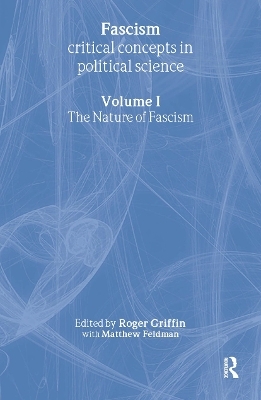
Fascism
Routledge
978-0-415-29015-9 (ISBN)
- Titel z.Zt. nicht lieferbar
- Versandkostenfrei innerhalb Deutschlands
- Auch auf Rechnung
- Verfügbarkeit in der Filiale vor Ort prüfen
- Artikel merken
The nature of 'fascism' has been hotly contested by scholars since the term was first coined by Mussolini in 1919. However, for the first time since Italian fascism appeared there is now a significant degree of consensus amongst scholars about how to approach the generic term, namely as a revolutionary form of ultra-nationalism. Seen from this perspective, all forms of fascism have three common features: anticonservatism, a myth of ethnic or national renewal and a conception of a nation in crisis. This collection includes articles that show this new consensus, which is inevitably contested, as well as making available material which relates to aspects of fascism independently of any sort of consensus and also covering fascism of the inter and post-war periods.
This is a comprehensive selection of texts, reflecting both the extreme multi-faceted nature of fascism as a phenomenon and the extraordinary divergence of interpretations of fascism.
Volume I: The Nature of Fascism
This volume samples the extraordinary range of contrasting theories that have been adopted to identify the nature of fascism since it first exploded into European history as a novel political force in the aftermath of the First World War.
Volume II: The Social Dynamics of Fascism
The second volume focuses on approaches which define fascism largely in terms of its social dynamics, in particular the nexus that binds it to capitalism. This volume includes examples of the rich varieties of Marxist analyses which present fascism as an international backlash to Communism by the forces of reaction.
Volume III: Fascism and Culture
Fascism's relationship to culture is the main focus of volume three. The articles in this section analyse whether or not fascism is the complete antithesis of culture or whether fascism is a bid to create a new type of society based on the total transformation not just of its political, moral, aesthetic values and institutions but also of the ethos that imbues all spheres of the nation's life.
Volume IV: The Singularity of Interwar Fascisms
Volume four looks at the individual fascisms which, unlike Fascism and Nazism, failed to seize state power. At the same time it highlights the distinction between these abortive movements and the authoritarian conservative regimes that by 1939 had sought legitimacy and mass consensus by imitating fascist regimes without undertaking their populist assault on the nation's entire culture.
Volume V: Postwar Fascism
The permutations of post-war fascism evoked via the articles in this volume ranges from neo-Nazism, to White Noise music, 'black' terrorism, Third Positionism and the New Right. Cumulatively they evoke the extraordinary way that fascism, in order to survive a political climate hostile to mass movements of revolutionary ultra-nationalism, has mutated, diversified and internationalised.
| Erscheint lt. Verlag | 4.12.2003 |
|---|---|
| Reihe/Serie | Critical Concepts in Political Science |
| Verlagsort | London |
| Sprache | englisch |
| Maße | 156 x 234 mm |
| Gewicht | 3923 g |
| Themenwelt | Sozialwissenschaften ► Politik / Verwaltung ► Politische Systeme |
| Sozialwissenschaften ► Politik / Verwaltung ► Politische Theorie | |
| ISBN-10 | 0-415-29015-5 / 0415290155 |
| ISBN-13 | 978-0-415-29015-9 / 9780415290159 |
| Zustand | Neuware |
| Haben Sie eine Frage zum Produkt? |